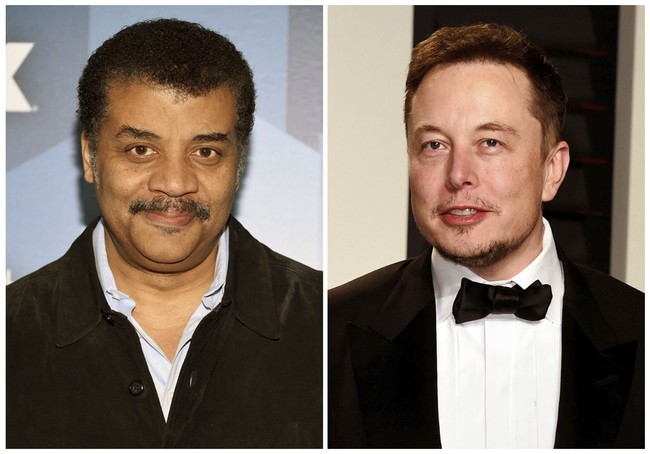Ed wrote about Neil deGrasse Tyson’s idiotic performance on Bill Maher’s show earlier today.
Ed’s post featured the fraud’s ideological defense of Scientific American and of alphabet ideology, both of which have been featured in Hot Air posts.
Tyson matters because he is a science “influencer” whose job it is to be an ambassador to the masses for scientists, who are generally not known for being outstanding communicators. Like Bill Nye the Science Guy, he is a fraud, selling not science but The Science™. He is a self-absorbed, politically motivated, profoundly ignorant, and compromised ignoramus.
I want to take another shot at Tyson–not just because I despise his pretentiousness, although I admit I enjoy poking at him every chance I get–because he is dangerous. As one of the “experts” who mislead people, he has an outsized impact on public opinion and needs to be taken down about ten pegs.
Wow, they really don’t get it.
Mars is critical to the long-term survival of consciousness.
Also, I’m not going to ask any venture capitalists for money. I realize that it makes no sense as an investment. That’s why I’m gathering resources. https://t.co/XVCpHKlusD
— Elon Musk (@elonmusk) November 23, 2024
Tyson’s appearance on Maher’s show is a godsend because he puts his ignorance on full display in front of an educated, middlebrow audience who tend to hang on to his every word. By middlebrow, I don’t mean any disrespect. Plenty of people in the middlebrow category are perfectly smart and intellectually curious, but they are not inclined to be or don’t have time to become intellectuals or members of the cultural elite.
They have lives to lead, so they catch up on matters through trusted people who act as a filter. We all do that to some extent, and it is often the highbrows who cause the most damage because they strive to display their intellectual prowess in destructive ways.
In any case, what was striking to me about Tyson’s musings about Elon Musk’s Mars project is how wrong he is about the modern push to space, and Musk’s in particular. Whether you think Musk’s project is quixotic or vital to the future of humanity, it resembles Tyson’s description not one little bit.
First and foremost, Tyson clearly sees Musk’s project to get to Mars as if it were a NASA-driven government project requiring massive national will and investment to achieve, like the 1960s moon mission. “From 1960 to 1973, the US federal government invested $25.8 billion into Project Apollo, which is about $318 billion in 2023 dollars. That comes out to $1,534 per person in the US at the time.” NASA’s current Artemis program will cost about $4.3 billion PER FLIGHT to put men on the moon, which is an astonishing number.
Of course, if you pursue the government model of space travel, it would require a national commitment to push the feds to do this. It is a high-cost, low-benefit proposition done solely for prestige. The US government would be pursuing a Mars landing to impress people or at best make science look cool. Scientifically speaking you could do far more science for far less money by investing in robotic vehicles.
Tyson looks at that and comes up with his asinine analysis because he so incurious he has an opinion based on no knowledge of what Musk is doing. Because Tyson is an ignoramus with the intellectual curiosity of a slug.
Elon Musk has spent the past 20 years preparing to make humanity multi-planetary. He built SpaceX for that purpose. He is not seeking investors to achieve that goal, and is not his intent to profit off the venture. In fact, he has become the richest man in the world because in the short run at least–far longer than his lifespan–building a civilization on Mars will be a huge resource sink.
He got rich to spend his fortune on achieving a massively expensive but in his view, absolutely necessary goal: make humanity resilient to disasters that could destroy Earth.
Musk has proven that he can accomplish what NASA can’t for pennies on the dollar, so comparing his approach to a NASA or NASA-style moon mission is like comparing the Soviet economy to America’s in the 1980s. There is no real comparison because one is not like the other, and one worked and the other didn’t.
Tyson doesn’t know that, so he doesn’t know anything about a subject he was “informing” Maher’s audience. His opinion on Musk is as informed as his opinions on COVID, alphabet ideology, or the quality of Scientific American.
Agree or disagree with Musk’s goals. But if you want to talk about them at least have a basic grasp of what he is doing.
Tyson is the model “expert” in the modern West. Filled with confidence while not understanding a thing.
Read the full article here




![This Something Both Democrats And Republicans Could Agree On – Carl Higbie [WATCH] This Something Both Democrats And Republicans Could Agree On – Carl Higbie [WATCH]](https://www.rvmnews.com/wp-content/uploads/2024/11/2024.11.23-02.11-rvmnews-6741e286977e2.jpg)
![WrestleMania Superstar Roman Reigns Shocks Leftist Fans With Pro-Trump Comments [WATCH] WrestleMania Superstar Roman Reigns Shocks Leftist Fans With Pro-Trump Comments [WATCH]](https://www.boredtrashpanda.com/wp-content/uploads/2025/04/2025.04.20-07.08-boredtrashpanda-68049d641d78c.jpg)




